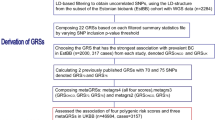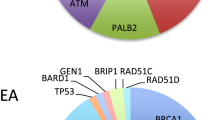Abstract
The aim of the study is to verify the hypothesis that genetic polymorphisms are associated with the predisposition to all malignancies. Using as a model breast cancers from the homogenous Polish population (West Pomeranian region) after stratification of 977 patients by age at diagnosis (under 51 years and above 50 years) and by tumour pathology (ductal cancers––low and high grade, lobular cancers, ER-positive/negative) we tested this hypothesis. Altogether 20 different groups of breast cancer cases have been analyzed. The results were compared to a group of unaffected controls that were matched by age, sex, ethnicity and geographical location and originated from families without cancers of any site among relatives. Molecular alterations selected for analyses included those which have been previously recognized as being associated with breast cancer predisposition. Statistically significant differences between the breast cancer cases and controls were observed in 19 of the 20 analyzed groups. Genetic changes were present in more than 90% of the breast cancer patients in 18 of 20 groups. The highest proportion of cases with constitutional changes—99.3% (139/140) was observed for lobular cancers. The number and type of genetic marker and/or the level of their association with the specific cancer predisposition was different between groups. Markers associated with majority of groups included: BRCA1, CHEK2, p53, TNRnTT, FGFRnAA, XPD CC/AA and XPD GG. Some markers appeared to be group specific and included polymorphisms in CDKN2A, CYP1B1, M3K nAA, and RS67.
Similar content being viewed by others
References
Easton DF, Pooley KA, Dunning AM, Pharoah PD, Thompson D, Ballinger DG, Struewing JP, Morrison J, Field H, Luben R, Wareham N, Ahmed S, Healey CS et al (2007) Genome-wide association study identifies novel breast cancer susceptibility loci. Nature 447(7148):1087–1093
The Wellcome Case Control Consortium (2007) Genome-wide association study of 14,000 cases of seven common diseases and 3000 shared controls. Nature 447:661–678
Dębniak T, Cybulski C, Górski B, Huzarski T, Byrski T, Gronwald J, Jakubowska A, Kowalska E, Oszurek O, Narod SA, Lubiński J (2007) CDKN2A-positive breast cancers in young women from Poland. Breast Cancer Res Treat 103(3):355–9
Cybulski C, Górski B, Huzarski T, Byrski T, Gronwald J, Dębniak T, Wokołorczyk D, Jakubowska A, Kowalska E, Oszurek O, Narod SA, Lubiński J (2006) CHEK2−positive breast cancers in young Polish women. Clin Cancer Res 12(16):4832–4835
Huzarski T, Lener M, Domagała W, Gronwald J, Byrski T, Kurzawski G, Suchy J, Chosia M, Woyton J, Uciński M, Narod SA, Lubiński J (2005) The 3020insC allele of NOD2 predisposes to early-onset breast cancer. Breast Cancer Res Treat 89(1):91–93
Huijts PE, Vreeswijk MP, Kroeze-Jansema KH, Jacobi CE, Seynaeve C, Krol-Warmerdam EM, Wijers-Koster PM, Blom JC, Pooley KA, Klijn JG, Tollenaar RA, Devilee P, van Asperen CJ (2007) Clinical correlates of low-risk variants in FGFR2, TNRC9, MAP3K1, LSP1 and 8q24 in a Dutch cohort of incident breast cancer cases. Breast Cancer Res 9(6):R78 [Epub]
Górski B, Byrski T, Huzarski T, Jakubowska A, Menkiszak J, Gronwald J, Płużanska A, Bębenek M, Fischer-Maliszewska L, Grzybowska E, Narod SA, Lubiński J (2000) Founder mutations in the BRCA1 gene in Polish families with breast-ovarian cancer. Am J Hum Genet 66:1963–1968
Górski B, Jakubowska A, Huzarski T, Byrski T, Gronwald J, Grzybowska E, Mackiewicz A, Stawicka M, Bębenek M, Sorokin D, Fiszer-Maliszewska L, Haus O, Janiszewska H, Niepsuj S, Góźdź S, Zaremba L, Posmyk M, Płużanska M, Kilar E, Czudowska D, Waśko B, Miturski R, Kowalczyk JR, Urbański K, Szwiec M, Koc J, Dębniak B, Rozmiarek A, Dębniak T, Cybulski C, Kowalska E, Tołoczko-Grabarek A, Zajączek S, Menkiszak J, Mędrek K, Masojć B, Mierzejewski M, Narod SA, Lubiński J (2004) A high proportion of founder BRCA1 mutations in Polish breast cancer families. Int J Cancer 110(5):683–686
Cybulski C, Górski B, Huzarski T, Masojć B, Mierzejewski M, Dębniak T, Teodorczyk U, Byrski T, Gronwald J, Matyjasik J, Złowocka E, Lener M, Grabowska E, Nej K, Castaneda J, Mędrek K, Szymańska A, Szymańska J, Kurzawski G, Suchy J, Oszurek O, Witek A, Narod SA, Lubiński J (2004) CHEK2 is a multiorgan cancer susceptibility gene. Am J Hum Genet 75(6):1131–1135
Cybulski C, Wokołorczyk D, Huzarski T, Byrski T, Gronwald J, Górski B, Dębniak T, Masojć B, Jakubowska A, Gliniewicz B, Sikorski A, Stawicka M, Godlewski D, Kwias Z, Antczak A, Krajka K, Lauer W, Sosnowski M, Sikorska-Radek P, Bar K, Klijer R, Zdrojowy R, Malkiewicz B, Borkowski A, Borkowski T, Szwiec M, Narod SA, Lubiński J (2006) A large germline deletion in the CHEK2 kinase gene is associated with an increased risk of prostate cancer. J Med Genet 43(11):863–866
Mędrek K, Górski B, Chudecka-Głaz A, Magnowski P, Jakubowska A, Dębniak T, Cybulski C, Masojć B, Grunwald J, Huzarski T, Byrski T, Matyjasik J, Złowocka E, Oszutowska A, Nej-Wolosiak K, Kładny J, Jaworowska E, Rzepka-Górska I, Spaczyński M, Narod SA, Lubiński J (2007) The 215G > C polymorphism of p53 is associated with well-differentiated breast and ovarian cancers. Br J Cancer (submitted)
Dębniak T, Scott RJ, Huzarski T, Byrski T, Masojć B, van de Wetering T, Serrano-Fernàndez P, Górski B, Cybulski C, Gronwald J, Dębniak B, Maleszka R, Kładny J, Bieniek A, Nagay L, Haus O, Grzybowska E, Wandzel P, Niepsuj S, Narod SA, Lubiński J (2006) XPD common variants and their association with melanoma and breast cancer risk. Breast Cancer Res Treat 98(2):209–215
Matyjasik J, Cybulski C, Masojć B, Jakubowska A, Serrano-Fernàndez P, Górski B, Dębniak T, Huzarski T, Byrski T, Gronwald J, Złowocka E, Narod SA, Scott R, Lubiński J (2007) CYP1B1 and predisposition to breast cancer in Poland. Breast Cancer Res Treat 106(3):383–388
Lubiński J, Huzarski T, Kurzawski G, Suchy J, Masojć B, Mierzejewski M, Lener M, Domagała W, Chosia M, Teodorczyk U, Mędrek K, Dębniak T, Złowocka E, Gronwald J, Byrski T, Grabowska E, Nej K, Szymańska A, Szymańska J, Matyjasik J, Cybulski C, Jakubowska A, Górski B, Narod SA (2005) The 3020insC allele of NOD2 predisposes to cancers of multiple organs. Her Can in Clin Pract 3(2):59–63
Górski B, Narod SA, Lubiński J (2005) A common missense variant in BRCA2 predisposes to early onset breast cancer. Breast Cancer Res 7(6):R1023–R1027
Dębniak T, Górski B, Huzarski T, Byrski T, Cybulski C, Mackiewicz A, Gozdecka-Grodecka S, Gronwald J, Kowalska E, Haus O, Grzybowska E, Stawicka M, Szwiec M, Urbański K, Niepsuj S, Waśko B, Góźdź S, Wandzel P, Szczylik C, Surdyka D, Rozmiarek A, Zambrano O, Posmyk M, Narod SA, Lubiński J (2005) A common variant of CDKN2A (p16) predisposes to breast cancer. J Med Genet 42(10):763–765
Hunter DJ, Kraft P, Jacobs KB, Cox DG, Yeager M, Hankinson SE, Wacholder S, Wang Z, Welch R, Hutchinson A, Wang J, Yu K, Chatterjee N, Orr N, Willett WC, Colditz GA, Ziegler RG, Berg CD, Buys SS, McCarty CA, Feigelson HS, Calle EE, Thun MJ, Hayes RB, Tucker M, Gerhard DS, Fraumeni JF Jr, Hoover RN, Thomas G, Chanock SJ (2007) A genome-wide association study identifies alleles in FGFR2 associated with risk of sporadic postmenopausal breast cancer. Nat Genet 39(7):870–874
Stacey SN, Manolescu A, Sulem P, Rafnar T, Gudmundsson J, Gudjonsson SA, Masson G, Jakobsdottir M, Thorlacius S, Helgason A, Aben KK, Strobbe LJ, Albers-Akkers MT, Swinkels DW, Henderson BE, Kolonel LN, Le Marchand L, Millastre E, Andres R, Godino J, Garcia-Prats MD, Polo E, Tres A, Mouy M, Saemundsdottir J, Backman VM, Gudmundsson L, Kristjansson K, Bergthorsson JT, Kostic J, Frigge ML, Geller F, Gudbjartsson D, Sigurdsson H, Jonsdottir T, Hrafnkelsson J, Johannsson J, Sveinsson T, Myrdal G, Grimsson HN, Jonsson T, von Holst S, Werelius B, Margolin S, Lindblom A, Mayordomo JI, Haiman CA, Kiemeney LA, Johannsson OT, Gulcher JR, Thorsteinsdottir U, Kong A, Stefansson K (2007) Common variants on chromosomes 2q35 and 16q12 confer susceptibility to estrogen receptor-positive breast cancer. Nat Genet 39(7):865–869
Wokołorczyk D, Gliniewicz B, Sikorski A, Serrano-Fernàndez P, Złowocka E, Masojć B, Dębniak T, Matyjasik J, Mierzejewski M, Mędrek K, Oszutowska D, Gronwald J, Huzarski T, Byrski T, Jakubowska A, Górski B, Cybulski C, Narod SA, Lubiński J (2008) A wide range of cancers is associated with the rs6983267 marker on chromosome 8. Cancer Res (submitted)
Broet P, de la Rochefordiere A, Scholl SM, Fourquet A, Mosseri V, Durand JC, Pouillart P, Asselain B (1995) Contralateral breast cancer: annual incidence and risk parameters. J Clin Oncol 13(7):1578–1583
Lishman SC, Lakhani SR (1999) Atypical lobular hyperplasia and lobular carcinoma in situ: surgical and molecular pathology. Histopathology 35(3):195–200
Lynch HT, Lynch J, Conway T, Watson P, Feunteun J, Lenoir G, Narod S, Fitzgibbons R Jr (1994) Hereditary breast cancer and family cancer syndromes. World J Surg 18(1):21–31
Acknowledgment
Authors thank Ms. E. Putresza for excellent technical support. Publication supported by grant of Polish Ministry of Science, No PBZ-KBN-122/PO5/2004.
Author information
Authors and Affiliations
Corresponding author
Electronic supplementary material
Rights and permissions
About this article
Cite this article
Lubiński, J., Korzeń, M., Górski, B. et al. Genetic contribution to all cancers: the first demonstration using the model of breast cancers from Poland stratified by age at diagnosis and tumour pathology. Breast Cancer Res Treat 114, 121–126 (2009). https://doi.org/10.1007/s10549-008-9974-8
Received:
Accepted:
Published:
Issue Date:
DOI: https://doi.org/10.1007/s10549-008-9974-8




